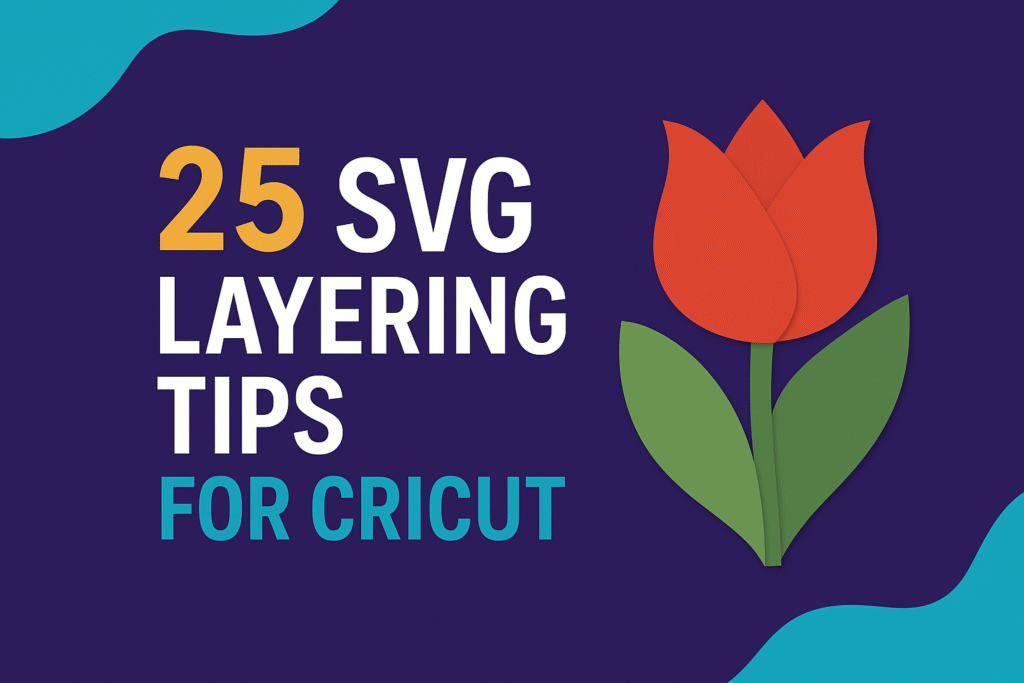Learn how to layer SVG files like a pro and transform your Cricut crafts into vibrant, multi-dimensional masterpieces.
Layering SVG files is one of the most powerful techniques you can master as a Cricut crafter. Whether you’re making colorful vinyl decals, intricate paper art, or eye-catching iron-on designs, the right layering strategy will give your projects depth, detail, and a professional touch.
In this complete guide, we’ll cover 25 expert SVG layering tips for Cricut — from choosing the right materials and tools to perfecting alignment and avoiding common mistakes.
Why Layering SVGs Is a Game-Changer
Layering is the process of stacking multiple design elements — often in different colors, materials, or textures — to build a final image. In Cricut crafting, this allows you to:
- Add depth and dimension for a 3D effect.
- Combine multiple colors seamlessly in a single design.
- Simplify complex cuts by breaking them into manageable layers.
- Experiment with textures like glitter vinyl, metallic cardstock, or fabric.
Essential Tools & Materials for Layered Cricut Projects
Before you start, make sure your craft station has:
- Cricut machine (Maker, Explore, or Joy)
- Cutting mats in LightGrip, StandardGrip, and StrongGrip
- Weeding tools for removing excess vinyl or paper
- Transfer tape (medium tack for most vinyl projects)
- Scraper or brayer for smooth application
- Heat press or iron for HTV layering
- Teflon sheets for heat protection
25 SVG Layering Tips for Cricut Success
1. Choose Layer-Friendly SVG Files
Look for SVGs labeled as “layered” or “multi-color ready.” These designs already have separate layers for each color, saving you setup time.
2. Organize Your Layers in Design Space
Ungroup your SVG and arrange layers by color. This keeps your workspace clean and speeds up the cutting process.
3. Use Color Preview
Change layer colors in Cricut Design Space to see exactly how your final project will look.
4. Work From Background to Foreground
Cut and apply the largest background layer first, then build forward with smaller detail layers.
5. Use Registration Marks
Add small identical shapes to each layer to help you align everything perfectly.
6. Don’t Skip the Test Cut
Intricate layers require precise cut settings — always test before cutting the full sheet.
7. Keep Layers Flat During Storage
Prevent curling by storing vinyl or cardstock layers between flat sheets.
8. Layer Vinyl from Back to Front
Apply the bottom-most vinyl layer first, pressing firmly before adding the next.
9. Burnish Between Layers
Use a scraper to smooth each layer before adding the next one to avoid bubbles.
10. Shorten Press Time for HTV Layers
For multi-layer HTV, press each layer briefly until the final one, which gets the full recommended time.
11. Protect with Teflon or Parchment Paper
When pressing HTV, shield previous layers to avoid scorching or melting.
12. Mix Materials for Texture
Combine vinyl with glitter vinyl, metallics, or patterned HTV for visual interest.
13. Use the Offset Tool for Shadows
Create a contrasting shadow layer to make your design pop.
14. Try Foam Tape for Paper Crafts
Add space between layers to create a 3D paper effect.
15. Keep Your Blade Sharp
Dull blades can tear intricate designs — replace them regularly.
16. Weed Small Details First
Removing small sections early prevents accidental tearing.
17. Use Medium-Tack Transfer Tape
High-tack tape can damage delicate layers, especially paper and glitter vinyl.
18. Align by Eye Before Committing
Lay layers together without adhesive first to check positioning.
19. Work on a Clean Surface
Dust or debris can create bumps between layers.
20. Label Your Cut Pieces
Use sticky notes or masking tape to mark which layer is which, especially for multi-color projects.
21. Use StrongGrip Mats for Thick Materials
Cardstock, wood veneer, or felt layers require extra hold.
22. Keep a Consistent Color Palette
Choose colors that complement each other for a cohesive look.
23. Apply Sealant for Durability
For mugs, signs, or outdoor decor, seal your vinyl layers for long-lasting results.
24. Frame 3D Paper Projects
Shadow boxes and layered wall art look professional when framed.
25. Practice, Then Personalize
The more you layer, the more creative techniques you’ll discover — from gradient effects to textured combinations.
Final Thoughts
Layering SVGs in Cricut isn’t just about stacking colors — it’s about building depth, telling a story through design, and making your crafts look professionally made. By following these 25 tips, you’ll gain the skills and confidence to create multi-color projects that truly stand out.
If you want ready-to-layer SVGs designed for Cricut perfection, check out CutFilesAcademy.com — a treasure chest of high-quality designs for every craft project.

